Wedding Officiant in Las Vegas
- Carlos Vallesillas

- Sep 24, 2025
- 11 min read
Everything You Need to Know
A wedding officiant is the person responsible for conducting the marriage ceremony. Their main role is to unite the couple in marriage while ensuring all legal requirements are met. There are different types of ceremonies that can be officiated, whether religious or civil. Hiring an experienced wedding officiant can provide benefits such as ceremony personalization and guidance throughout the planning process. In Las Vegas, having a reliable wedding officiant is an excellent choice to make your wedding a truly memorable experience.

Table of Content
Roles and Responsibilities of a Wedding Officiant
Types of Ceremonies Officiated
Benefits of Hiring a Wedding Officiant
Considerations for Choosing a Wedding Officiant
Civil and Religious Ceremonies
The Officiant’s Role in Ceremony Planning
Legal Aspects and Requirements for Getting Married with an Officiant
Wedding Officiant in Las Vegas
Everything You Need to Know
A wedding officiant is the person responsible for conducting the marriage ceremony. Their main role is to unite the couple in marriage while ensuring all legal requirements are met. There are different types of ceremonies that can be officiated, whether religious or civil. Hiring an experienced wedding officiant can provide benefits such as ceremony personalization and guidance throughout the planning process. In Las Vegas, having a reliable wedding officiant is an excellent choice to make your wedding a truly memorable experience.
What Is a Wedding Officiant?
A wedding officiant is a professional in charge of carrying out the marriage ceremony. Their main responsibility is to lead and preside over the event, ensuring that all necessary rituals and formalities are observed so that the union is both legal and meaningful.
Although wedding officiants may come from diverse backgrounds and training, their primary role is to act as emotional and spiritual facilitators during the wedding process. They serve as guides and advisors to the couple, helping them personalize and structure the ceremony according to their individual beliefs, values, and preferences.
A wedding officiant has the ability to create a warm and meaningful atmosphere, setting the right tone for the event. Their presence and words have the power to unite the couple and their loved ones, creating a unique and memorable experience for everyone present.
A wedding officiant is authorized to legally solemnize the marriage, fulfilling all necessary legal requirements and procedures.
They are experts in different types of ceremonies, both religious and civil, adapting to the needs and preferences of each couple.
They provide emotional support and guidance during the ceremony planning, helping the couple make informed and relevant decisions.
They offer flexibility and creativity to personalize the ceremony, incorporating rituals and symbolic elements that reflect the couple’s story and values.
They guide the couple in writing their wedding vows, ensuring their feelings and commitments are expressed sincerely and authentically.

Roles and Responsibilities of a Wedding Officiant
A wedding officiant plays a fundamental role in the marriage ceremony. Their main function is to preside over and carry out the ceremony, ensuring that everything unfolds properly while respecting the couple’s preferences.
Some of the responsibilities of a wedding officiant include:
Creating a warm and personalized environment for the couple and their guests.
Guiding the couple in planning the ceremony, from selecting readings and wedding vows to determining the overall structure of the event.
Offering options and suggestions to personalize the ceremony according to the couple’s beliefs and values.
Leading the ceremony clearly and smoothly, ensuring that all elements and rituals are carried out correctly.
In addition to these responsibilities, a wedding officiant also plays an important role as a counselor and emotional support for the couple. They can provide guidance and advice in moments of doubt or indecision, ensuring that the ceremony truly reflects the couple’s love and commitment.
It is essential to have an experienced and trustworthy wedding officiant, as their presence and skills can make a significant difference in the quality and meaning of the marriage ceremony. Their ability to adapt to the couple’s needs and wishes, as well as to convey emotions and messages effectively, is key to creating an unforgettable experience for everyone attending the wedding.

OUR WEDDING OFFICIANT AT GRACE BODAS
Types of Ceremonies Officiated
A wedding officiant offers a wide variety of options for couples who want to personalize their ceremony. Below are some of the most common types of ceremonies:
Religious Ceremony: In this type of ceremony, the officiant is a religious representative, such as a minister, pastor, or rabbi, and the ceremony follows the couple’s religious traditions and beliefs. It is important to choose an officiant who shares the couple’s religious views and can provide a meaningful ceremony.
Civil Ceremony: This non-religious ceremony is conducted by a civil officiant, such as a judge or mayor. The ceremony can be customized according to the couple’s wishes and has no restrictions regarding content or format. It is a popular option for couples seeking a secular ceremony or those with different religious backgrounds.
Spiritual Ceremony: Some couples choose a spiritual ceremony where the officiant focuses on universal aspects of life and love instead of following a specific religious tradition. These ceremonies are usually personalized and may include spiritual elements or symbolic rituals.
Themed Ceremony: Couples who want to add a unique and fun touch to their ceremony may opt for a themed wedding. This can range from outdoor ceremonies to weddings with a specific theme, such as movies, travel, or historical periods. The officiant works alongside the couple to create a ceremony that reflects their personality and style.
These are just a few examples of the types of ceremonies a wedding officiant can offer. It is important to communicate with the officiant beforehand to discuss the couple’s preferences and expectations. This way, the ceremony can be fully personalized and meaningful for both.

Benefits of Hiring a Wedding Officiant
Hiring a professional wedding officiant can provide a variety of important benefits for your wedding ceremony. Here are some of the main advantages of working with an officiant:
Experience and Knowledge: An experienced wedding officiant has extensive knowledge of the marriage process and conducting ceremonies. They are familiar with rituals and traditions and can also provide advice and recommendations based on prior experience.
Personalization: A wedding officiant can personalize the ceremony to fit your wishes and preferences. They can adapt their words and rituals to reflect the couple’s story and values, making the ceremony unique and meaningful.
Flexibility in Location: Unlike religious ceremonies, which are usually held in places of worship, a wedding officiant can conduct the ceremony at the location of your choice. Whether it’s outdoors in a garden, indoors at an event hall, or something as incredible as getting married in a helicopter or at the Grand Canyon, you have the freedom to choose the perfect setting for your wedding.
Emotional Connection: A wedding officiant can establish an emotional connection with the couple and guests. They can convey messages of love and celebrate the union in a way that creates a sentimental and memorable experience for everyone present.
Flexibility in Content: Unlike religious ceremonies, hiring an officiant gives you more flexibility in the ceremony’s content. You can include readings, poems, or any other element you wish to make the ceremony unique and special.
Support and Guidance: A wedding officiant can provide support and guidance throughout the planning and preparation process. They can advise you on legal aspects, marriage requirements, and help you create a ceremony that reflects your beliefs and values.
These are just some of the benefits of hiring a wedding officiant. Their experience, personalization, and support during the planning process make having a professional officiant an excellent choice for making your wedding ceremony unforgettable.
WE ARE SPECIALISTS IN WEDDING PLANNING IN LAS VEGAS
Considerations for Choosing a Wedding Officiant
When choosing a wedding officiant, it is important to consider certain factors that will ensure your ceremony is special and meaningful. Here are some key considerations:
Experience and Style: Look for an officiant with prior experience in conducting wedding ceremonies. Ask about their style and approach to make sure it aligns with your preferences and personality as a couple.
Personalization: A good officiant should be willing to personalize the ceremony according to your wishes and beliefs. Make sure they are open to including rituals or elements that are meaningful to you and your partner.
Personal Connection: It is essential to establish a good personal connection with your officiant. They should be able to understand and reflect your love story during the ceremony. Schedule a meeting or interview to see if there is good chemistry between you.
Flexibility and Availability: Make sure the officiant is flexible regarding the date and time of the ceremony. It’s also important that they are available to answer your questions and provide support throughout the planning process.
Fees and Contract: Discuss the officiant’s fees in advance and confirm what services are included in the price. It’s also recommended to sign a contract outlining all agreed details to avoid confusion or misunderstandings.
Taking these considerations into account when selecting a wedding officiant will help ensure that your ceremony is unique, meaningful, and memorable. Remember, this is the person responsible for uniting you in marriage, so it is crucial to choose someone you trust and feel comfortable with.
Civil and Religious Ceremonies
One of the crucial decisions you must make when planning your wedding is the type of ceremony you want to have: civil or religious. Each has its own characteristics, and it’s important to understand the differences in order to make the best choice for your big day.
Civil Ceremonies
Civil ceremonies are officiated by a non-religious wedding officiant, usually a judge or government official. This type of ceremony is ideal for couples who do not follow a particular faith or who prefer a more neutral and secular ceremony.
Flexibility: Civil ceremonies offer greater flexibility in terms of location and content. You can have the ceremony anywhere you wish, whether in a park or even in your own backyard.
Personalization: Since it is not tied to specific religious traditions, you can personalize the civil ceremony according to your own wishes and values. You may include personalized wedding vows, unique rituals, and meaningful readings.
Shorter Duration: In general, civil ceremonies tend to be shorter than religious ones, making them a popular option for couples who want a more intimate and simple celebration.
Religious Ceremonies
Religious ceremonies are performed by a wedding officiant representing a specific religious tradition, such as a priest, pastor, rabbi, or imam. These ceremonies are suitable for couples who practice a faith and want to include religious elements and traditions in their wedding.
Spiritual Meaning: Religious ceremonies hold deep spiritual significance for couples who practice a faith. You may receive blessings and take part in sacred rituals that represent your religious beliefs.
Community: Religious ceremonies are often held in places of worship and provide an opportunity to bring together family and friends from the faith community to celebrate your marriage.
Tradition: Religious ceremonies are rooted in tradition and usually follow a specific structure and set of rituals. This can provide a sense of connection with past generations and a feeling of continuity.
Ultimately, the choice between a civil and religious ceremony depends on your personal beliefs, preferences, and values as a couple. Consider which type of ceremony best reflects your relationship and the values you wish to express on your wedding day.
The Officiant’s Role in Ceremony Planning
The wedding officiant plays a crucial role in planning the wedding ceremony. Their experience and skills allow them to help couples create a unique and meaningful ceremony that reflects their love and values. Here are some important aspects the officiant may consider during this process:
Initial Meetings: The officiant typically schedules meetings with the couple to learn about their love story, desires, and preferences for the ceremony. This helps them fully understand the couple’s vision and adapt the ceremony to their needs.
Selection of Rituals: If the couple wishes to include special rituals in the ceremony, such as a sand ceremony or a unity candle ritual, the officiant can offer options and explain the symbolism behind each one. They may also adapt existing rituals or even create new personalized ones that reflect the couple’s story and values.
Writing the Script: The officiant is responsible for drafting the ceremony script. This includes speeches, readings, wedding vows, and any other elements the couple wants to include. The officiant will work closely with the couple to ensure the script reflects their style and personality.
Coordination with Other Vendors: At times, the officiant may also act as a coordinator with other wedding service providers, such as photographers, musicians, or event planners. This helps ensure a smooth and synchronized execution of the ceremony.
Rehearsal: Before the big day, the officiant often organizes a ceremony rehearsal. During the rehearsal, details are reviewed, and any questions or concerns the couple may have are addressed. This helps ensure that everything goes as planned on the wedding day.
WE ARE SPECIALISTS IN WEDDING PLANNING IN LAS VEGAS
Legal Aspects and Requirements for Getting Married with an Officiant
Before hiring a wedding officiant, it’s important to understand the legal aspects and requirements necessary for an official marriage. Although specific details vary by state, there are some general requirements that apply in most places in the United States:
Marriage License: Before the ceremony, the couple must obtain a valid marriage license, which can be issued at the county clerk’s office or city hall. It’s essential to present the proper documents, such as proof of identity, birth certificates, and other legal requirements.
Waiting Period: Some states have a mandatory waiting period before you can get married. This means that once the marriage license is issued, the ceremony cannot take place immediately; a certain number of days must pass, depending on the jurisdiction.
Presence of Witnesses: In most cases, one or more witnesses must be present at the ceremony. These individuals must be of legal age and capable of legally witnessing the marriage. The number of required witnesses may vary by state.
Authorized Officiant: It is essential that the wedding officiant is authorized to perform legal marriages in the corresponding state. When choosing an officiant, it’s important to verify their status and ensure they are properly registered and authorized to conduct wedding ceremonies.
Marriage Registration: After the ceremony, the officiant is responsible for registering the marriage with the civil registry. This involves submitting the signed and completed marriage license so that the marriage is legally recognized.
It is important to keep these legal aspects and requirements in mind before hiring a wedding officiant. Ensuring that all legal formalities are met guarantees that the marriage is valid and officially recognized.
Wedding Officiant in Las Vegas: Why Is It a Great Choice?
Las Vegas, known as the Wedding Capital of the World, is the perfect place to celebrate your dream wedding. And to make your ceremony even more special, hiring a wedding officiant in Las Vegas is a smart choice. Why? Here are a few reasons:
Experience and Professionalism: Wedding officiants in Las Vegas are experts in conducting wedding ceremonies. They have extensive experience in the field and know every detail to ensure your wedding is perfect.
Personalization and Creativity: Wedding officiants in Las Vegas give you the opportunity to fully personalize your ceremony. You can choose your own vows, special rituals, and unique themes to make your wedding a completely customized and memorable event.
Location Flexibility: Las Vegas offers a wide variety of incredible venues to celebrate your wedding. Whether in an elegant wedding chapel, a luxury hotel, or even on the famous Las Vegas Strip, the officiant will adapt to your preferences and help you find the perfect location for your ceremony.
Knowledge of Legal Requirements: Getting married in Las Vegas may involve meeting certain legal requirements. A wedding officiant in Las Vegas will guide you and ensure that all legal aspects are properly handled so that your marriage is valid and legal.
Planning Guidance: A wedding officiant in Las Vegas not only takes care of the ceremony itself but can also provide guidance in planning your wedding. They can advise you on choosing vendors, organizing the ceremony program, and all the necessary details to make sure everything goes perfectly.

WE ARE SPECIALISTS IN WEDDING PLANNING IN LAS VEGAS
If you would like to have a Guide on How to Get Married in LAS VEGAS, you must click on the following link, enter your information, and you will receive your Guide in your email.



























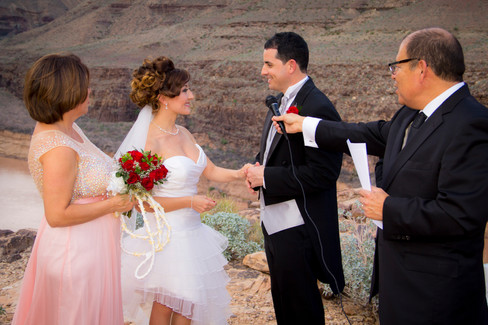





















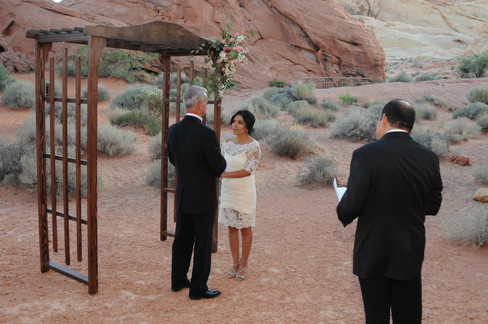















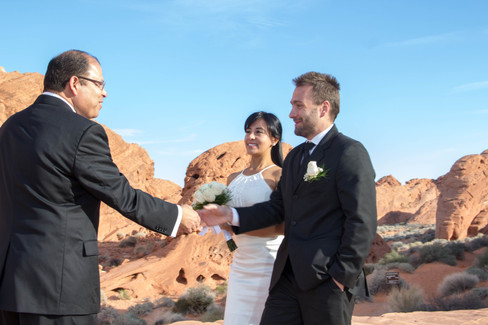



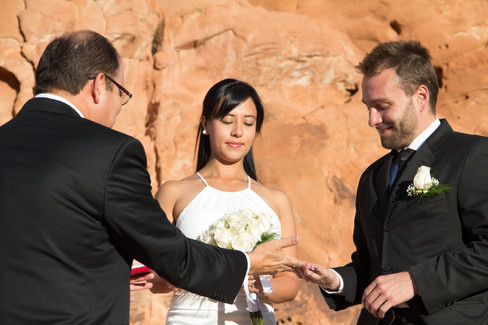













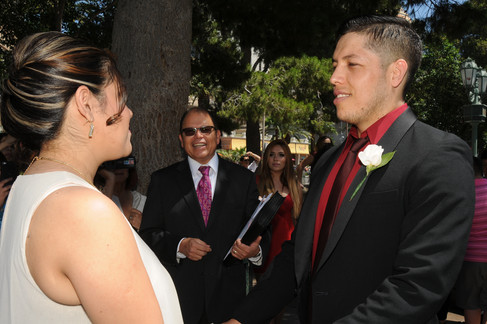















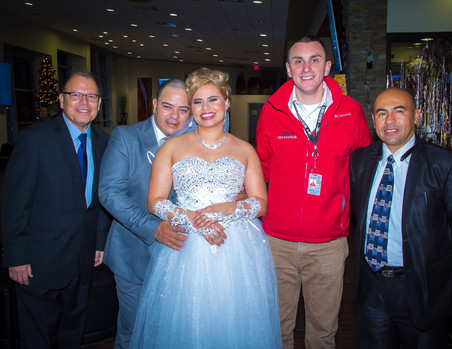




Comments